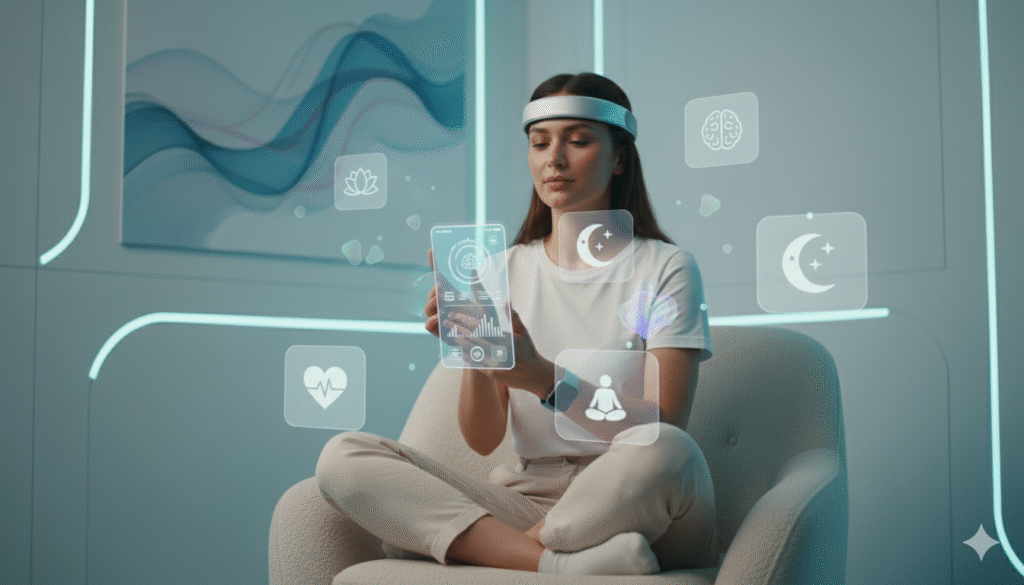Introduction:
In today’s fast-paced digital era, mental health has become one of the most talked-about aspects of overall well-being. From stress and anxiety to sleep issues and burnout — people are seeking smart, tech-driven solutions to take care of their minds.
This is where mental health technology and wellness gadgets step in. With wearables, apps, and even biohacking tools, we now have the power to monitor, manage, and enhance our mental wellness right from our wrists or smartphones.
1. The Rise of Mental Health Technology
Mental health tech is a rapidly growing field that uses data, AI, and smart sensors to help users understand their emotions and habits. These technologies are designed to make mental wellness more accessible, personalized, and proactive.
According to recent reports, the global mental health tech market is expected to exceed $10 billion by 2027, with more people using apps and devices to track mood, sleep, and stress levels.
2. Wearable Devices for Mental Health & Wellness
Wearables are no longer just about counting steps or heart rate — they now measure stress, sleep, focus, and even emotional balance.
Here are some popular examples:
a. Fitbit Sense / Fitbit Charge
-
Tracks stress response through electrodermal activity (EDA) sensors.
-
Offers guided breathing exercises for relaxation.
b. Apple Watch
-
Measures heart rate variability (HRV), an indicator of stress and recovery.
-
Provides Mindfulness and Breathe apps to manage anxiety.
c. Muse Headband
-
A brain-sensing headband that provides real-time feedback on meditation and focus using EEG sensors.
-
Helps train your brain for relaxation.
d. Oura Ring
-
Tracks sleep quality, readiness score, and body temperature.
-
Ideal for optimizing rest and recovery.
e. Apollo Neuro
-
Uses vibration therapy to help users relax, sleep, or focus better by stimulating the vagus nerve.
💡 These devices use biofeedback and physiological data to help you understand how your body and mind react to daily stressors.
3. Mental Health & Wellness Apps
Apps play a key role in modern wellness routines. Whether for meditation, therapy, or journaling, they provide on-demand mental health support anytime, anywhere.
Popular Mental Health Apps:
-
Calm – Focuses on meditation, relaxation sounds, and guided sleep stories.
-
Headspace – Offers short mindfulness sessions, stress reduction tools, and sleep aids.
-
Wysa – An AI-powered chatbot providing emotional support and mood tracking.
-
Moodfit – A data-driven app that tracks mood, exercise, sleep, and nutrition to improve mental health.
-
BetterHelp – Connects users with licensed therapists through online sessions.
These apps use AI, CBT (Cognitive Behavioral Therapy), and mindfulness to help users build mental resilience and cope with daily challenges.
4. The Biohacking Revolution
Biohacking refers to using science and technology to optimize your body and mind for better performance.
In mental health, biohackers experiment with wearables, brain stimulation, supplements, and lifestyle tracking to enhance mood, focus, and productivity.
Common Biohacking Tools:
-
Neurostimulation Devices: Like FocusCalm or Halo Neuroscience that boost concentration and creativity using mild electrical pulses.
-
Blue Light Glasses: Reduce eye strain and improve sleep by blocking harmful blue light.
-
Cold Exposure & Breathing Apps: Inspired by the Wim Hof Method, they help reduce stress hormones and boost energy.
-
Nootropic Supplements: Natural or synthetic compounds like L-theanine, omega-3, and ashwagandha for cognitive enhancement.
💬 Biohacking is about taking control of your biology — combining science, technology, and mindfulness for peak mental performance.
5. Benefits of Mental Health Tech & Gadgets
✅ Real-time feedback — Understand your mental and physical states instantly.
✅ Personalized insights — Tailored recommendations based on your data.
✅ Improved mindfulness — Build better focus and self-awareness.
✅ Accessibility — Get mental health support without visiting clinics.
✅ Motivation — Gamified progress tracking keeps you engaged.
6. Privacy and Ethical Concerns
While these tools offer great benefits, users should also be cautious about data privacy.
Mental health apps often collect sensitive emotional and biometric data, so it’s essential to choose reputable brands that use secure, transparent data policies.
7. The Future of Mental Wellness Tech
The future looks bright for mental health technology.
AI-driven wearables, brain-computer interfaces (BCIs), and digital twins of mental states are already being researched. Soon, devices may predict mood swings or detect early signs of depression before symptoms appear.
As technology advances, mental health care will become more predictive, preventive, and personalized.
Conclusion
Mental health tech and wellness gadgets are reshaping how we care for our minds. Whether it’s a smart ring tracking your stress, a biohacking headset boosting focus, or an AI-powered app guiding meditation — technology is empowering us to live calmer, more balanced lives.
In the end, the goal isn’t to replace human emotions with machines — but to use technology to understand ourselves better and create harmony between mind, body, and tech.



